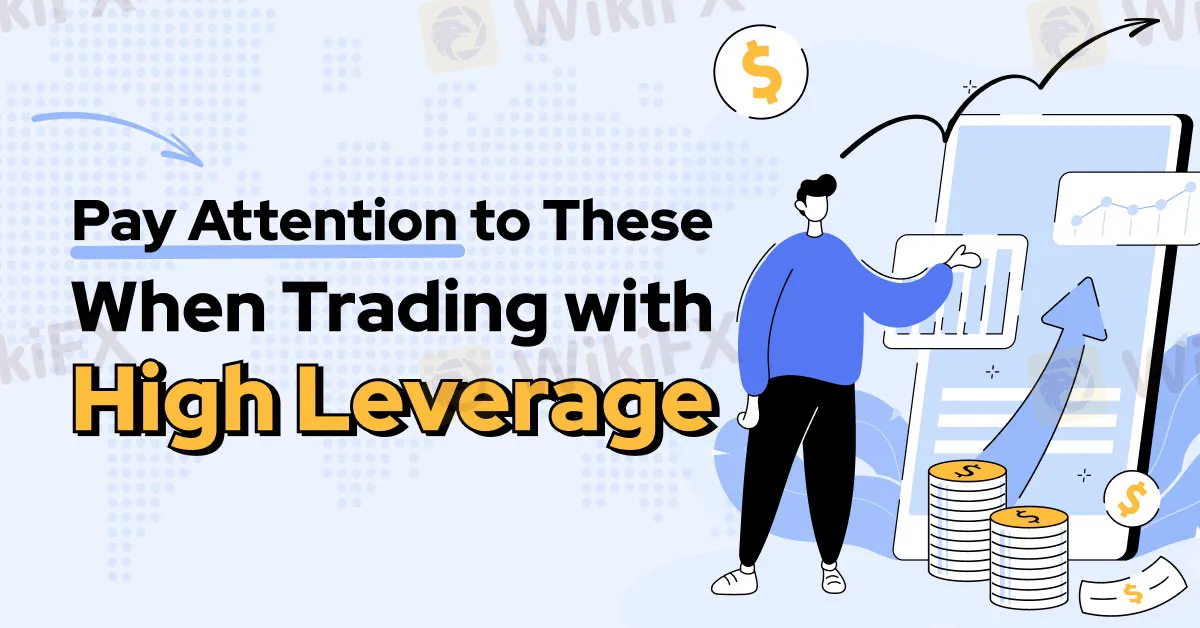简体中文
繁體中文
English
Pусский
日本語
ภาษาไทย
Tiếng Việt
Bahasa Indonesia
Español
हिन्दी
Filippiiniläinen
Français
Deutsch
Português
Türkçe
한국어
العربية
Pay Attention to These When Trading with High Leverage
Abstract:In the realm of forex and cryptocurrency trading, leveraging is a common practice that allows traders to amplify their positions with borrowed capital. While high leverage can potentially lead to significant gains, it also carries inherent risks that traders should be mindful of. Understanding and managing these risks is essential for navigating the volatile markets effectively.

In the realm of forex and cryptocurrency trading, leveraging is a common practice that allows traders to amplify their positions with borrowed capital. While high leverage can potentially lead to significant gains, it also carries inherent risks that traders should be mindful of. Understanding and managing these risks is essential for navigating the volatile markets effectively.

One crucial aspect to consider when trading with high leverage is the potential for magnified losses. While leverage can amplify profits, it can also amplify losses, leading to rapid depletion of trading capital if positions move against the trader. As such, it's vital for traders to employ risk management strategies such as setting stop-loss orders and maintaining proper position sizing to mitigate potential losses.
Another factor to pay attention to is market volatility. High leverage combined with volatile market conditions can result in increased price fluctuations, making it challenging to predict market movements accurately. Traders should be prepared for sudden price swings and take steps to protect their positions accordingly.
Additionally, traders should be aware of the impact of leverage on margin requirements. High leverage typically requires smaller margin requirements, allowing traders to control larger positions with a relatively small amount of capital. However, this also means that traders are more susceptible to margin calls if their positions move against them. It's essential to monitor margin levels closely and ensure sufficient funds are available to support open positions.
Furthermore, regulatory considerations play a crucial role when trading with high leverage. Different jurisdictions have varying regulations governing leverage limits and margin requirements for forex and cryptocurrency trading. Traders should familiarize themselves with the regulatory landscape in their jurisdiction and adhere to any applicable guidelines to avoid regulatory issues.
Lastly, it is essential for traders to have a thorough understanding of the products they are trading and the risks involved. High leverage products such as derivatives and margin trading can be complex instruments that require a level of expertise to trade successfully. Traders should conduct thorough research, stay informed about market developments, and seek professional advice if needed.
In conclusion, while high leverage trading can offer opportunities for significant returns, it also comes with increased risks that traders must carefully manage. By paying attention to factors such as potential losses, market volatility, margin requirements, regulatory considerations, and product knowledge, traders can navigate high leverage trading environments more effectively and protect their capital.

Disclaimer:
The views in this article only represent the author's personal views, and do not constitute investment advice on this platform. This platform does not guarantee the accuracy, completeness and timeliness of the information in the article, and will not be liable for any loss caused by the use of or reliance on the information in the article.
Read more

The Hidden Checklist: Five Unconventional Steps to Vet Your Broker
Forex broker scams continue to evolve, employing new tactics to appear credible and mislead unsuspecting traders. Identifying these fraudulent schemes requires vigilance and strategies beyond the usual advice. Here are five effective methods to help traders assess the legitimacy of a forex broker and avoid potential pitfalls.

Doo Financial Obtains Licenses in BVI and Cayman Islands
Doo Financial, a subsidiary of Singapore-based Doo Group, has expanded its regulatory footprint by securing new offshore licenses from the British Virgin Islands Financial Services Commission (BVI FSC) and the Cayman Islands Monetary Authority (CIMA).

CFI’s New Initiative Aims to Promote Transparency in Trading
A new programme has been launched by CFI to address the growing need for transparency and awareness in online trading. Named “Trading Transparency+: Empowering Awareness and Clarity in Trading,” the initiative seeks to combat misinformation and equip individuals with resources to evaluate whether trading aligns with their financial goals and circumstances.

Malaysian-Thai Fraud Syndicate Dismantled, Millions in Losses Reported
The Royal Malaysia Police (PDRM) has received 26 reports concerning the Nicshare and CommonApps investment schemes, both linked to a major fraudulent syndicate led by a Malaysian citizen. The syndicate’s activities came to light following the arrest of its leader by Thai authorities on 16 December.
WikiFX Broker
Latest News
AIMS Broker Review
The Hidden Checklist: Five Unconventional Steps to Vet Your Broker
YAMARKETS' Jingle Bells Christmas Offer!
Why is there so much exposure against PrimeX Capital?
Russia to Fully Ban Crypto Mining in 10 Regions Starting January 1, 2025
MTrading’s 2025 "Welcome Bonus" is Here
Doo Financial Obtains Licenses in BVI and Cayman Islands
CFI’s New Initiative Aims to Promote Transparency in Trading
Currency Calculator



